|
|
|
Sort Order |
|
|
|
Items / Page
|
|
|
|
|
|
|
| Srl | Item |
| 1 |
ID:
128999
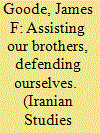

|
|
|
|
|
| Publication |
2014.
|
| Summary/Abstract |
The Iranian military intervention in Oman (1972-75) proved to be one of Shah Mohammad Reza Pahlavi's most successful foreign policy initiatives. He entered at the request of Sultan Qabus to help quell the Marxist rebellion of the Popular Front for the Liberation of Oman in Dhufar province. The shah took this action without any prior consultation with either Britain or the United States, acting for reasons wholly related to Iran's regional security. In so doing, he angered most of his Arab neighbors, who protested vigorously. He persisted. His troops tipped the balance in favor of the sultan's forces, contributing to a speedy end to the insurrection, for which Iran earned the lasting gratitude of the sultan.
|
|
|
|
|
|
|
|
|
|
|
|
|
|
|
|
| 2 |
ID:
128998
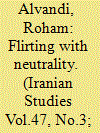

|
|
|
|
|
| Publication |
2014.
|
| Summary/Abstract |
Despite the Eisenhower administration's strong support for the Pahlavi monarchy, tensions simmered under the surface of Mohammad Reza Shah's relationship with the United States throughout the 1950s. Following the Qarani coup attempt and the overthrow of the Iraqi monarchy in 1958, the shah sought to diminish the Soviet threat to his regime and reduce his dependence on the United States by exploring Moscow's offer of a non-aggression treaty. Drawing on American, British, and Iranian sources, this article provides the first detailed history of these secret Soviet-Iranian negotiations that ended in disastrous failure for the shah in February 1959.
|
|
|
|
|
|
|
|
|
|
|
|
|
|
|
|
| 3 |
ID:
128995
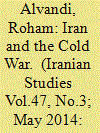

|
|
|
|
|
| Publication |
2014.
|
| Summary/Abstract |
For five decades, fromthe 1940s to the 1980s, Iran lived in the shadow of the Cold War between the United States and the Soviet Union. The country's geography, bordering both the USSR and the oil-rich Persian Gulf, meant that its territory and natural resources were of vital strategic importance in the ideological and material contest between the two superpowers, a global struggle over nothing less than "the soul of mankind."1 With the passage of nearly seventy years since the first Soviet-American confrontation in northern Iran, a growing number of scholars are examining the history of Iran's ColdWar, especially during the reign of Mohammad Reza Shah Pahlavi. Building on the work of earlier diplomatic historians, this emerging historiography looks both inward, at the impact of the Cold War on Iran, and outward, at the role of Iran in the Cold War far beyond its borders.2 This special issue showcases examples of this recent work by historians of Iran's Cold War, some of which was presented at the 2012 biannual conference of the International Society for Iranian Studies in Istanbul. Iran's importance in the Cold War is reflected in the rich literature on Iran's international history during the late Pahlavi period. The 1946 Iranian crisis marked the beginning of Iran's Cold War and the origins of the alliance between the United States and Iran, which continued until the fall of Mohammad Reza Shah in 1979.
|
|
|
|
|
|
|
|
|
|
|
|
|
|
|
|
| 4 |
ID:
129000
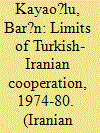

|
|
|
|
|
| Publication |
2014.
|
| Summary/Abstract |
Why did Turkey and Iran fail to become close partners in the 1970s even though they had compelling reasons to do so? This article argues that mutual distrust between Turkish and Iranian leaders, domestic turmoil in the two countries, and diverging geostrategic priorities undermined Ankara and Tehran's efforts to deepen their relations. While the shah of Iran saw his country as the policeman of the Persian Gulf and the Middle East, successive governments in Turkey continued to look west for their security. As economic and political turmoil engulfed the two countries, leading to a revolution in Iran in 1979 and a coup in Turkey in 1980, Iranian and Turkish leaders could not forge a lasting partnership.
|
|
|
|
|
|
|
|
|
|
|
|
|
|
|
|
| 5 |
ID:
128996
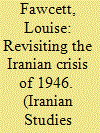

|
|
|
|
|
| Publication |
2014.
|
| Summary/Abstract |
The Iranian crisis of 1946 occupies a significant place in the early history of the Cold War. While this fact has been increasingly acknowledged by scholars, there remain aspects of the crisis, in particular the motivations of the major actors involved, which demand further exploration. This article reconsiders the roles of early Cold War actors, including the United Kingdom, the United States, the Soviet Union and Iran itself in the Azerbaijan crisis and offers a synthesis of different perspectives. In revisiting the crisis it draws upon Cold War and post-Cold War literature including recently available archival material. It aims to combine contributions from International Relations, the Cold War and Iranian history to offer a balanced and integrated narrative of events.
|
|
|
|
|
|
|
|
|
|
|
|
|
|
|
|
| 6 |
ID:
128997
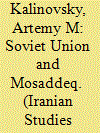

|
|
|
|
|
| Publication |
2014.
|
| Summary/Abstract |
Although it is generally accepted that the Soviet Union did not play a significant role in the events leading to the overthrow of Mohammed Mosaddeq in 1953, little has been written about how the Soviets perceived the Iranian leader and the movement he inspired. This article argues that Soviet leaders generally saw Mosaddeq as weak and ill-disposed towards the Soviet Union. The Soviet failure to secure an oil concession in Iran in 1946 and general conservatism about anti-colonial movements during the late Stalin period conditioned their assessment of Mosaddeq's premiership. After Soviet policy towards the Third World changed in the mid-1950s, Mosaddeq's movement was reinterpreted as a genuine "struggle of national liberation."
|
|
|
|
|
|
|
|
|
|
|
|
|
|
|
|
|
|
|
|
|